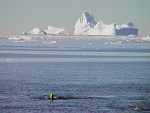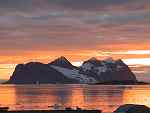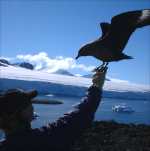|
This may have to be my last e-mail
from Antarctica as I�m due to fly out on the 21st of February. It�s going
to be a day of very mixed emotions for me. As you can imagine after
sixteen months away from home I cannot wait to see my family again. There
will be some celebrating on the 25th when I finally make it to Inverness
airport after six flights in four days.
 Until
then I�m going to really make the most of my time whilst at the station. I
have been working a lot this last month on the local islands, helping
visiting scientists and preparing equipment for the winter months. The
best job I have had though is helping the divers test their new dry suits!
This of course meant spending a very pleasant morning snorkelling in the
bay (see picture). The diving program will be resuming shortly much to the
relief of the marine biologists. The loss of the Bonner lab has had a big
impact on their work but after some very fast work from our UK office
(based in Cambridge), a new decompression chamber and dive facility has
already been bought, packed and shipped to Rothera. Until
then I�m going to really make the most of my time whilst at the station. I
have been working a lot this last month on the local islands, helping
visiting scientists and preparing equipment for the winter months. The
best job I have had though is helping the divers test their new dry suits!
This of course meant spending a very pleasant morning snorkelling in the
bay (see picture). The diving program will be resuming shortly much to the
relief of the marine biologists. The loss of the Bonner lab has had a big
impact on their work but after some very fast work from our UK office
(based in Cambridge), a new decompression chamber and dive facility has
already been bought, packed and shipped to Rothera.
 I
am very fortunate to be able to work away from the station during the
summer months and travel to many beautiful places. I do however have some
very interesting jobs on base including the monitoring of the breeding
population of the South Polar Skuas (Catharacta maccormicki)
nesting on Rothera point. I
am very fortunate to be able to work away from the station during the
summer months and travel to many beautiful places. I do however have some
very interesting jobs on base including the monitoring of the breeding
population of the South Polar Skuas (Catharacta maccormicki)
nesting on Rothera point.
Jenny Island
Skuas are large, brown gull-like
birds and are the most southern-living bird in the world (one has even
been spotted at the South Pole). They nest along the entire coast of the
Antarctic continent, including the peninsula where our station is
situated. Their nests are simple scrapes in the ground with the more
nest-proud birds using what little vegetation of mosses and lichens that
they can find. When threatened they display to one another by puffing out
their breast and holding their wings high over their backs. People
intruding into their nest sites are greeted with shrieks and threatening
dives, which can lead to a few well placed strikes on the head.
Breeding territories are claimed
with the males protecting the same general location year after year. Being
such good opportunistic feeders they have learnt to visit bases throughout
the Antarctic to receive handouts. Their individuality makes some of them
favoured pets. Unfortunately for the first time in over seventeen years
George, our base Skua, did not return to Rothera this summer.
 We
have eighteen nests on Rothera point and so far this year twenty-eight
eggs were laid and fifteen chicks have hatched. The survey is undertaken
weekly and the information from the last fourteen years can help us to
look at any effects, positive or negative, that the base is having on the
population. I have become very familiar with each pair and my favourite
has to be �Hamish�, who likes to sit on my hand when I enter his nesting
area. I don�t know why he does this and sometimes he even steals my hat
(see picture)! We
have eighteen nests on Rothera point and so far this year twenty-eight
eggs were laid and fifteen chicks have hatched. The survey is undertaken
weekly and the information from the last fourteen years can help us to
look at any effects, positive or negative, that the base is having on the
population. I have become very familiar with each pair and my favourite
has to be �Hamish�, who likes to sit on my hand when I enter his nesting
area. I don�t know why he does this and sometimes he even steals my hat
(see picture)!
Hamish - A Wild Skua
For the first time in several
months I noticed it was beginning to get dark last night. The sun barely
sets in the summer months but now the seasons are changing and in the
middle of winter the sun barely rises. The view from the station can be
amazing at this time of year as the sun sets behind Jenny Island (see
picture). I am going to thoroughly enjoy these last few weeks and I must
go now and get in some last minute skiing practise.
All the best
Mairi |